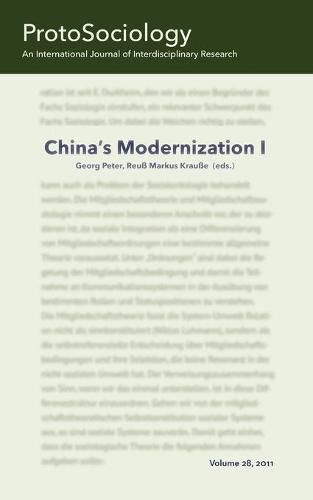Readings Newsletter
Become a Readings Member to make your shopping experience even easier.
Sign in or sign up for free!
You’re not far away from qualifying for FREE standard shipping within Australia
You’ve qualified for FREE standard shipping within Australia
The cart is loading…






This title is printed to order. This book may have been self-published. If so, we cannot guarantee the quality of the content. In the main most books will have gone through the editing process however some may not. We therefore suggest that you be aware of this before ordering this book. If in doubt check either the author or publisher’s details as we are unable to accept any returns unless they are faulty. Please contact us if you have any questions.
The idea of only one way leading to a modern society seems to be hardly tenable. But even if we agree to this, our theories and terms describing modernization are gained on our own Western history. So social science has to reconsider its basic terms to describe China’s modernization, and maybe even the understanding of modernization itself. The first of two volumes on China’s modernization, collects articles by leading Chinese and Western scientists focusing on the main conflicts and differences this process involves. In a first section - Changing China: Dealing with Diversity -, Bjoern Alperman analyses the terms Class, Citizenship and Individualization in China’s Modernization . Andrew Kipnis analyses the Chinese Nation-Building as, Instead of, and Before Globalization , while John R. Gibbins examines Principles for Cosmopolitan Societies: Values for Cosmopolitan Places . On Modernization: Law, Business, and Economy in China , the second section, deals with Modernizing Chinese Law: The Protection of Private Property in China by Sanzhu Zhu, Chinese Organizations as Groups of People - Towards a Chinese Business Administration by Peter J. Peverelli, and Income Gaps in Economic Development: Differences among Regions, Occupational Groups and Ethnic Groups by Ma Rong. The last section - Thinking Differentiations: Chinese Origin and the Western Culture - concentrates on the role of religion with articles by Richard Madsen ( Christianity and Hybrid Modernity in China ) and Thorsten Botz-Bornstein ( Confucianism, Puritanism, and the Transcendental: China and America ). Jeffrey N. Wasserstrom argues that Nathan Sharansky’s test for free nations should take regional variations into account in China and the Town Square Test . In Metaphor, Poetry and Cultural Implicature Ying Zhang examines if the Western understanding of metaphor can be transferred to Chinese language and culture. The additional rubric On Contemporary Philosophy involves three artic
$9.00 standard shipping within Australia
FREE standard shipping within Australia for orders over $100.00
Express & International shipping calculated at checkout
This title is printed to order. This book may have been self-published. If so, we cannot guarantee the quality of the content. In the main most books will have gone through the editing process however some may not. We therefore suggest that you be aware of this before ordering this book. If in doubt check either the author or publisher’s details as we are unable to accept any returns unless they are faulty. Please contact us if you have any questions.
The idea of only one way leading to a modern society seems to be hardly tenable. But even if we agree to this, our theories and terms describing modernization are gained on our own Western history. So social science has to reconsider its basic terms to describe China’s modernization, and maybe even the understanding of modernization itself. The first of two volumes on China’s modernization, collects articles by leading Chinese and Western scientists focusing on the main conflicts and differences this process involves. In a first section - Changing China: Dealing with Diversity -, Bjoern Alperman analyses the terms Class, Citizenship and Individualization in China’s Modernization . Andrew Kipnis analyses the Chinese Nation-Building as, Instead of, and Before Globalization , while John R. Gibbins examines Principles for Cosmopolitan Societies: Values for Cosmopolitan Places . On Modernization: Law, Business, and Economy in China , the second section, deals with Modernizing Chinese Law: The Protection of Private Property in China by Sanzhu Zhu, Chinese Organizations as Groups of People - Towards a Chinese Business Administration by Peter J. Peverelli, and Income Gaps in Economic Development: Differences among Regions, Occupational Groups and Ethnic Groups by Ma Rong. The last section - Thinking Differentiations: Chinese Origin and the Western Culture - concentrates on the role of religion with articles by Richard Madsen ( Christianity and Hybrid Modernity in China ) and Thorsten Botz-Bornstein ( Confucianism, Puritanism, and the Transcendental: China and America ). Jeffrey N. Wasserstrom argues that Nathan Sharansky’s test for free nations should take regional variations into account in China and the Town Square Test . In Metaphor, Poetry and Cultural Implicature Ying Zhang examines if the Western understanding of metaphor can be transferred to Chinese language and culture. The additional rubric On Contemporary Philosophy involves three artic